As part of the celebration of the 35th Library and Information Services Month, we take a closer look at the UPOU Library. As an institution of open learning, UPOU has transformed the way library services have been provided to its students. It has also harnessed technology to curate and disseminate open educational resources. In a world where new technologies are reshaping the way we find and use information, the question arises: What roles does the “library of the future” play?
You may be wondering how UPOU provides library services to its students. Does UPOU even have a library? If UPOU students are based in different parts of the country and the world, how do they access it?
Yes, UPOU has a library. It even has its own space at the Community Hub Building, UPOU Headquarters in Los Baños, Laguna, where students can read and borrow from the physical collections. For the most part, the UPOU Library operates at a distance, mirroring the technology-enabled instruction that is at the core of UPOU’s teaching and learning.
A digital library
Joel Ocier, UPOU’s OIC-Head Librarian, explains, “Though physical spaces remain for on-site research, the library’s main goal is to serve as a digital hub.”
“Unlike conventional libraries centered on physical spaces for in-person access, it emphasizes remote 24/7 online access to its collections and virtual delivery of learning and research support.”
Just like its counterparts in brick-and-mortar universities, the UPOU Library also provides a full range of library services, including borrowing of books, literature search assistance, library orientation, referrals to other libraries, and even anti-plagiarism checks.
What makes it unique is that these services are performed remotely through the use of online technologies. For example, instead of walking into a library to seek assistance, students can just email the librarian. Students can also borrow physical books by submitting an online request and having the materials sent to them via courier.
Curator of Open Educational Resources
As an open university, UPOU advocates the sharing of knowledge through open educational resources (OER). “The University Library actively supports its use,” Mr. Ocier said. “OERs are essential for open and distance learning as they provide students with quick, free access to learning materials.”
UPOU has produced thousands of OER, which are made available through the repository UPOU Networks. The Library has started cataloging and recording them in its system to make them easier to find and access.
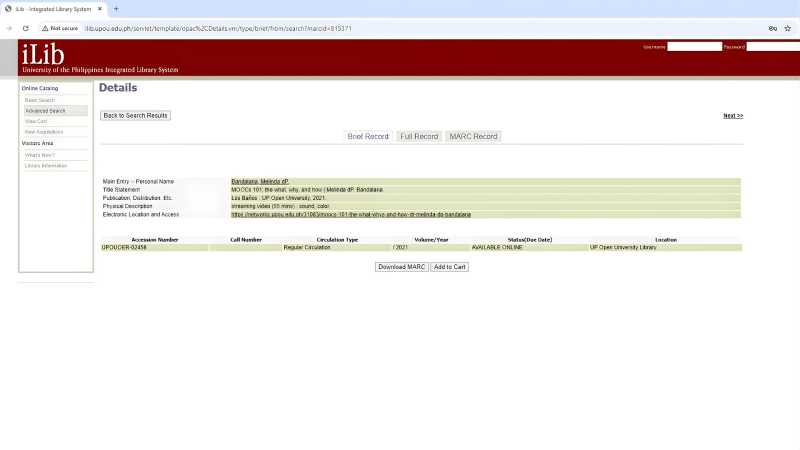
The UPOU Library enhances access to learning materials by cataloging open educational resources for learners.
The UPOU Library enhances access to learning materials by cataloging open educational resources for learners.
“We also provide a curated list of recommended OERs, organized by academic program and available on the library website for easy reference. These include books, articles, videos, and other free educational materials.”
In addition to multimedia materials, UPOU maintains another platform for collecting and sharing scholarly works, including theses, dissertations, journal articles, conference papers, reports, and datasets.
“UPLOAD is our institutional repository for scholarly works. Alongside content management,” Mr Ocier explains, “the library ensures public access to works that authors have made freely available. The platform now includes over 400 open-access theses and dissertation. It supports our thrust in promoting open scholarship.”
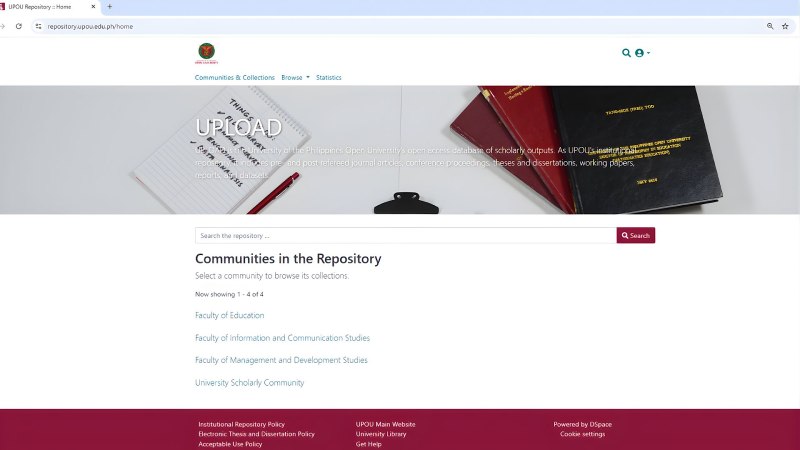
Through UPLOAD, UPOU makes its research outputs openly accessible to learners and scholars worldwide.
The Library also assists authors in submitting their works, creating descriptive metadata, making sure guidelines are followed, keeping the platform accessible, and preserving research for the long term.
Both UPLOAD and UPOU Networks are accessible to non-UP students and researchers.
Future Plans
At a time when information can be accessed through a query on an AI application, what role does a library perform? “At present, the University Library addresses AI challenges by promoting academic integrity, identifying AI-generated content in student submissions, and supporting responsible AI use through instruction and reference services,” Mr. Ocier said.
The library also recognizes that AI has a role to play in creating more personalized experiences for library users in the future. “We stay up to date on developments in artificial intelligence to keep our services relevant,” he remarked.
In the years to come, the UPOU Library plans to expand its digital collections and provide perpetual access to resources for long-term availability.
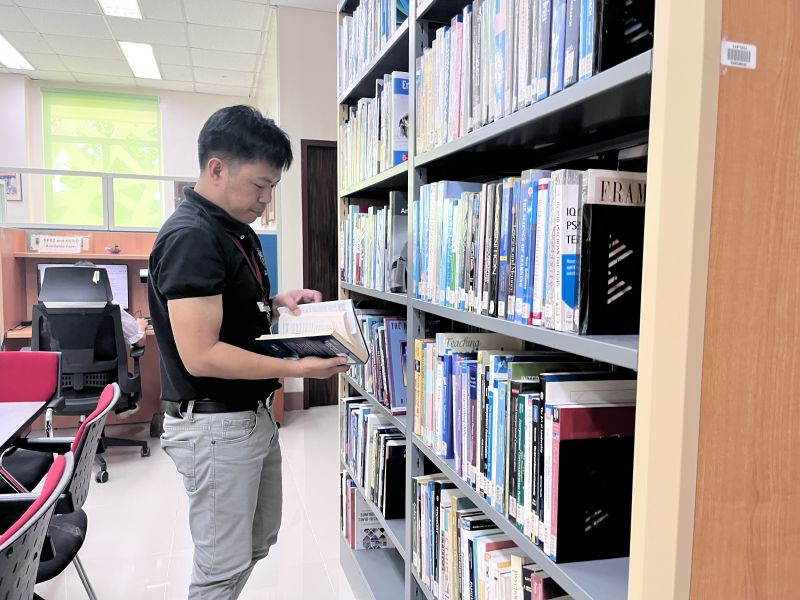
Mr. Joel Ocier at the UPOU Library.
As part of its efforts to enhance UPLOAD, the Library shall review and redesign the platform starting in 2026, while exploring AI applications across other library platforms. It is also completing the digitization of print theses and dissertations for preservation, access, and UPLOAD integration.
“We are also working on strengthening research and reference support by enhancing online services. Among our plans next year is to officially launch the library’s online consultation service, and development of a massive open online course (MOOC) on information literacy”, Mr Ocier shared.
These efforts will be further supported by the plan to re-establish the unit library at the Diliman Mega Learning Hub to provide on-site assistance to users.“Hopefully, these initiatives will further increase the visibility and reach of the university library,” Mr. Ocier said.
Envisioning the Library of the Future
The development of new technologies has changed the way people seek information. How does the UPOU Librarian see the role of libraries in this evolving landscape?
“I can see the library of the future as a dynamic hub that transcends its traditional role as a repository, evolving into an active partner in knowledge creation, collaboration, and lifelong learning,” he said.
He believes that libraries are expected to embrace technologies such as AI-assisted research tools, robotics, and seamless digital platforms. Yet, libraries must continue to serve as hubs for human insight — curiosity, learning and discovery.
As Mr. Ocier concluded, the library of the future will be “inclusive, more people-centered, and highly connected. It shall foster an environment in which creativity and innovation transform information into insight and promote lifelong learning.”
Written by Primo G. Garcia | Photo by Elvy Pamulaklakin







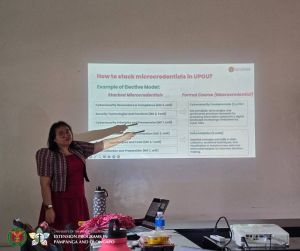

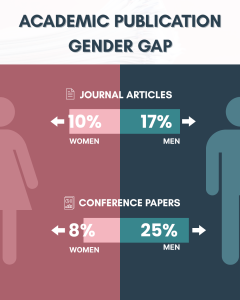
![[REGISTRATION EXTENSION]
The Registration Period for 2nd Semester AY 2025-2026 has been extended until 22 January 2026. All new and continuing students may register through the Online Registration System (ORS) accessible through the UPOU Student Portal.
For updates, visit our.upou.edu.ph.
#OpenDistanceLearning #UPOU #UPOpenUniversity #elearning](https://www.upou.edu.ph/wp-content/plugins/instagram-feed/img/placeholder.png)